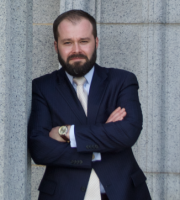Angiulo: The Internet, Free Speech, and Escorts
Monday, March 21, 2016

The plaintiffs in Jane Doe No. 1 et al v. Backpage.com, LLC et al sued a website that functions like a classified section of a newspaper. Different goods and services were offered for sale by third parties who used the website to communicate their information. The issue raised by the plaintiffs was that the website made money on the escort postings and those postings had facilitated their victimization as minors. According to the plaintiffs, they had been underage victims of sex trafficking and sued the website for its role in the offense.
There is a line to be drawn between the proverbial madam of a bordello and a website. That line was demarcated by Congress and places most websites on the legal side of this division. The law is cited as 47 USC §230 and is titled “Protection for private blocking and screening of offensive material”. This law was passed in the late 1990's to grow online content in the United States. The findings and policy statements included in it are snapshots of how the internet has come to dominate Americans consumption of information.
In the late 90's the legislature was compelled to act because of the outsized role of the internet in political, educational, and cultural development. Section 230 is their response to this Internet boom and the text of the law addresses two issues: a) sometimes websites need to regulate content without fear of being sued, and b) websites shouldn't usually have to worry about being sued for content posted by third parties. In the case of Jane Doe, the court was most concerned with the second part of this equation.
Traditionally, publishers of material were liable for the contents of their papers. What §230 does, in part, is make it so websites can facilitate the free exchange of ideas without assuming liability for the content. One way to describe this law is to shield the people who manufacture bullhorns from liability for the words that come out of their product.
In theory, there aren't too many Americans who would object to laws that facilitate the free expression of thought. Lawsuits, and the real people behind them, have a way of spoiling academic exercises. The sad truth is that, according to the plaintiffs, the website in question was allegedly used to facilitate underage sex trafficking. This is an ugly reality for anyone to consider and strains the altruist principles behind the applicable statute.
The rule of law, however, does not bend to distasteful realities and the justices of the First Circuit Court of Appeals had a difficult job to do. Namely, they had to apply a law that does a good thing to a difficult situation. While no one wants to be responsible for contributing to a crime like this the justices made clear that §203 does not protect criminal behavior. If appropriate, a prosecutor could have pursued the relevant website without being barred by the statute.
Absent such criminal actions, the website was merely providing a service protected by law. What the third parties had chosen to do with that service is the offense. Our Country makes room for the offensive, the distasteful, and the ugly parts of human nature. The consequences for some of these actions are criminal prosecution. The remainder are free to be expressed, for better or worse.

Related Articles
- Angiulo: Defamation, Opinions, and Rock n Roll
- Angiulo: Drug Dependent Defendants Have Options
- Angiulo: Further Refining Parental Discipline Standards in MA
- Angiulo: Custody of Refugees Without Parents
- Angiulo: Cell Phone Tracking in Massachusetts
- Angiulo: When Working From Home Causes a Lawsuit
- Angiulo: Railroad in Grafton Subject to Federal Law
- Cheat Sheet 11, The Patriarca Papers Unveil Sam Giancana, Meyer Lansky and Jerry Angiulo
- Angiulo: American Civilians Injured Abroad Have Limited Options
- Angiulo: Arbitration Requirements, Consumer Protection & the Supreme Court
- Angiulo: Questioning the Reliabilty of Eyewitness Identifications
- Angiulo: First Circuit Reviews Denial of Mental Health Benefits
- Angiulo: Marital Privilege May Keep Spouses out of the Witness Box
- Angiulo: The Difference Between Bad Parenting & Criminal Acts
- Angiulo: Sup. Ct. Says U.S. Juveniles Serving Life Without Parole Eligible for Review
- Angiulo: Personal Injury Claims, Liens, and the Supreme Court
- Angiulo: Taking Immigrants Into Custody
- Angiulo: What Happens When a Witness has a Sealed Record?
- Angiulo: Defining the Law for Misdemeanor Arrests
- Angiulo: When a Member of the Public is Injured on Your Property
- Angiulo: Supreme Court Explains Why Government Must Turn Over Evidence to Defendants
- Angiulo: Law Enforcement, Qualified Immunity and Use of Force
- Angiulo: Involuntary Commitment for Drug & Alcohol Abuse in MA
- Angiulo: House Judiciary Committe Reports Out Sentencing Reform Act of 2015
- Angiulo: Unintended, Tragic, Consequences of Intentional Acts




 Delivered Free Every
Delivered Free Every
Follow us on Pinterest Google + Facebook Twitter See It Read It